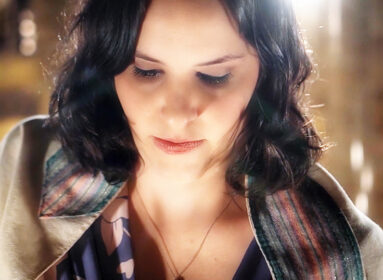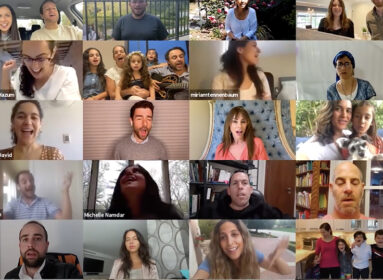By Cindy Mindell ~
NEW LONDON – When cataloging the various Jewish denominations of today, the list might range from Humanistic to ultra-Orthodox, but there is one group missing from most tallies: the “military Jew.”
Lt. Jonathan Heesch of the Coast Guard Academy and the National Oceanic and Atmospheric Administration (NOAA) found himself considering the label when he moved with his wife and two young children to New London in 2011.
“Only in America can we decide what ‘type’ of Jew we are,” he says. “I am a Jew and I observe as much as I can within the bounds of my mission, and through my mission I will make the world a better place because I prepare leaders and instill leadership.”
When it comes to observance, the bottom line for a Jew in the military, he explains, is, “I do what I can how I can when I can.”
Heesch’s Jewish journey is tightly intertwined with his military journey. Born in 1980 in Sioux Falls, S.D. to a Reform Jewish mother and “an old-hippie, ‘Druid’ dad” from a Methodist home, Heesch grew up in a family that celebrated the holidays of both religions, but he always identified as a Jew. He attended Sunday school at Mt. Zion Congregation, a small synagogue in Sioux Falls, where he became a bar mitzvah and went through Confirmation. He also attended Catholic school from second through tenth grades. “For the most part there was nothing but respect,” Heesch says. “
Tenth grade was a turning point, when a teacher enumerated the ways the Church had helped Jews during the Holocaust. “I questioned him,” Heesch says. “And I transferred to an alternative public school the following year.”
During high school, Heesch was involved in Police Explorers, and hoped to join the local police force after graduation. But when he learned that recruits had to be 21, he started looking into military service.
Five hours after his high-school graduation in 1998, Heesch was on a plane to the Marine’s bootcamp in San Diego, Calif. for combat training. “The drill sergeant recognized that I was Jewish – it was on my dogtags,” he says. “Every Friday at sunset, he would stop the drill formation and tell me, ‘Go do your Jew stuff.’”
For the rest of the year, Heesch found a way to engage in “Jew stuff” in Fort Leonard Wood, Mo. and Camp Pendleton, CA, where he met his future wife, Dory. The two married in early 1999 and were living in Oceanside, Calif., when they first started exploring Judaism as a couple.
Born into a Catholic family, Dory had been raised in foster care and was exposed to different religions. “She did a lot of research,” Heesch says. “The one religion she felt she related to was Judaism.”
The Heesches began attending Shabbat and holiday services at Temple Solel in San Diego. After their son was born in 2000, they moved a lot with the Marine Corps – first to Biloxi, Miss., then to Okinawa in 2003, just as the U.S. was preparing to invade Iraq. Heesch had trained as a truck driver, then as a meteorologist and oceanography forecaster. He was assigned to the III Marine Expeditionary Force, as part of the Meteorology and Oceanography (METOC) Support Team.
He spent nine months in Al Anbar Province and supported the second battle of Faluja.
“When you’re getting shelled by mortars every day and there are people who want to kill you, it gives you a lot of perspective,” he says. He lost a good friend to an IED. “I’ve carried a lot of survivor guilt,” he says. “I got back to Okinawa and I was a very angry person, I was very angry with God. Is there a God? How did he let my friend die? How does He let a war go on, how does He let people die?”
Heesch was 26; his son was 5. “My wife said, ‘We need to give him a moral compass’ and suggested that we go to Shabbos services at the military base. I said, ‘Yeah, whatever; I don’t care.’ She said, ‘Either we’re going to take him to services on Saturday or I’ll take him to church on Sunday morning.’”
The Shabbat service was led by a master gunnery sergeant; the Heesches doubled the size of the congregation. It was an informal affair: the group recited the Shema, discussed the Torah portion, and had refreshments. “When we left, I felt better about things and couldn’t explain why,” Heesch says. “We started going on a weekly basis.”
Six months later, Heesch became the congregation’s lay leader when the gunnery sergeant rotated out of Okinawa. Heesch was reluctant to take the position – “I could barely read Hebrew and I didn’t remember anything from Sunday school,” he says. “Then he told me that I had to wear a yarmulke, that I had to stick out for the benefit of other Jewish service-people. I saw that yarmulkes came in neat designs, so I said okay.” (Marine Corps regulations allow a black or “hair-colored” kippah.)
“The group was very Reform,” he says. “Jews in the military are usually laid back because of military requirements. Jews came out of the woodwork. I got emails and phone calls; people were asking me what to do for a bris. Thank God for the Internet, where I found Chabad and Aish.” The Jewish Welfare Board supplied the group with materials and rabbis for the holidays.
Heesch started studying online. He learned that observant Jews don’t use electricity on Shabbat and decided to incorporate the mitzvah into home life.
“Our first Shabbos, we sat in the dark and my wife, said, ‘I don’t think we’re supposed to do this,’ so we slowly figured out how to do it,” he says.
In 2006, the family left Okinawa and Heesch had come to a significant decision. “After Iraq, and with my increased understanding of Judaism and what’s really important in life, I decided that the Marine Corps was not where I needed to stay,” he says. “It’s not designed for families. In fact, there’s a saying: ‘If the Marine Corps wanted you to have a wife, they would issue you one.’”
Fast-forward to 2012, through Katy, Tex. (the “City of Churches”), Great Neck, N.Y., Woods Hole, Mass., and Gulfport, Miss., Lt. Jonathan Heesch is now the junior officer in charge of the NOAA Officer Training Center, commuting between NOAA in Kings Point, N.Y. and the U.S. Coast Guard Academy, where he also serves as the uniformed advisor to the Jewish Club.
The family – now numbering four – has Shabbat dinner every Friday and spends Saturdays together. Dory has resumed her conversion process, put on hold when the family was transferred from Woods Hole.
Heesch, who doesn’t affiliate with any particular Jewish movement or denomination, wears a black kippah and tzitzit (though military regulations specify that the latter may not be visible). While he rarely is asked about his head-covering any more, he does get many opportunities to explain why he will not shake a woman’s hand. “I say, ‘I’m sorry, I can’t shake your hand; it’s against my religion. It’s not out of disrespect for you, but out of respect for my wife,’” Heesch explains.
The first instance of Heesch’s religious modesty was misinterpreted, and resulted in a sexual discrimination charge (hastily dismissed). The next time, a higher-ranking officer contacted Heesch’s executive officer to deliver a personal commendation for character. When Rear Admiral Sandra Stosz was inducted as superintendent of the Coast Guard Academy last year, she put out her hand and Heesch explained why he could not shake it. “She said, ‘That is so amazing, it’s such a beautiful example of diversity, that just shows the strength of our organization, how we can come together and all get along, and how you can stand up for your beliefs,’” Heesch recalls. “Overall, being Shomer Negia is received strangely. But if I explain the deeper meaning, most people say, ‘That’s beautiful.’”
While Jews have always served in the U.S. military, their presence can still raise eyebrows, both from within the ranks and in the civilian world. While stationed in Okinawa, Heesch met Rabbi Marshal Klaven, a chaplain with the U.S. Air Force who joined up in response to zealous Christian proselytizing efforts in that branch of the military. The two “Jews in green” crossed paths again when the Heesches were living in Mississippi.
“During my basic officer training and chaplain training, there was a huge amount of energy expended by the Air Force about religious tolerance,” Klaven says. “I cannot say that it all went away, as many Christian chaplains still felt uneasy if they did not pray in the name of Jesus when among mixed company in a required formation. But my presence there was meant to help educate my colleagues, modeling how one can be authentic to their faith while facilitating the faith of others. I never saw a conflict, because Judaism believes that there are numerous paths to God.”
Now a rabbi at the Goldring/Woldenberg Institute of Southern Jewish Life in Jackson, Miss., Klaven says that he has observed “some genuine shock regarding a Jew in uniform” throughout his career. “While I heard that question, ‘What’s a nice Jewish boy like you doing in the military?’ I often responded by explaining to these individuals that there are Jews serving in the military, and that wherever a Jew is, I will be there to support them.”








 Southern New England Jewish Ledger
Southern New England Jewish Ledger
















